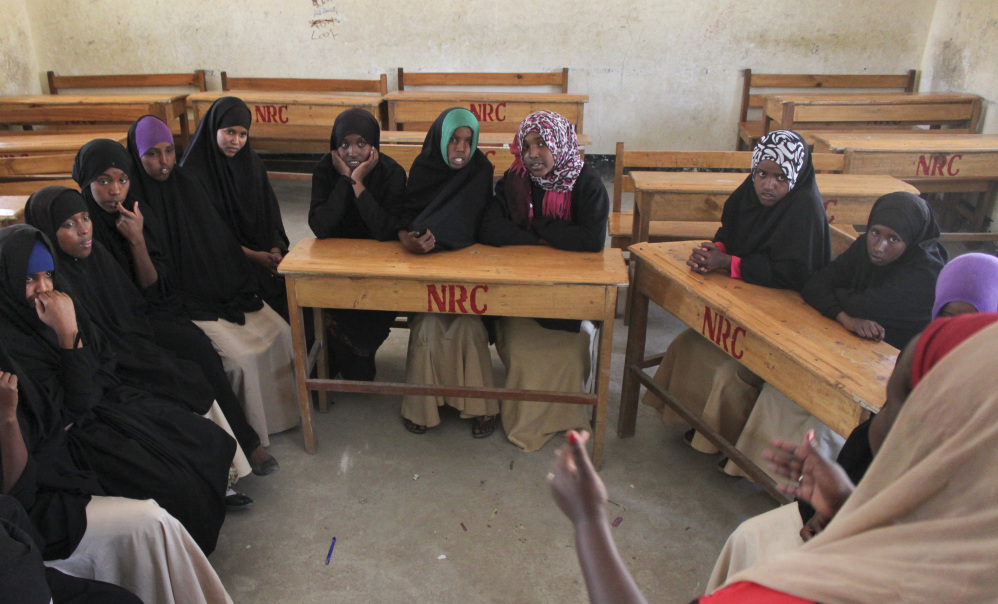HARGEISA, Somaliland — The 30 Somali teenagers – both boys and girls – all agreed: Female genital mutilation is harmful and the practice should be abandoned. But what they really meant, they revealed moments later, is that girls should have their genitalia cut – just not sewn shut.
“It’s our tradition and if the girls are not subjected to suna(cutting) she will not be accepted for marriage,” said Asthma Ibrahim Jabril, 17.
The students, who are part of an after-school club in Somaliland, which the U.N. children’s agency helps fund, discuss issues like child labor, early marriage, and female genital mutilation in a classroom with several large hearts scrawled along the walls.
UNICEF is weaving a delicate campaign to educate communities in Somaliland about the harms of female genital mutilation and to get leaders, who are meeting there this month to debate the practice, to denounce it. Child rights advocates in nearly 30 countries are fighting to reduce the number of girls subjected to the cutting of their genitalia, a practice that goes back thousands of years and that Somali practitioners often link to Islamic requirements.
All 15 girls sitting opposite the boys at Sheik Nuur Primary School have undergone suna–the removal of the clitoris and the labia minora. They all said it was the right thing to do.
FGM comes in many different forms. The other form known by the Somali teens is sewing the vagina shut until marriage. Everyone agreed that this should be ended.
“I want it to be eradicated. It’s an old tradition,” said Ikram Ismail, a confident 18-year-old in a pink headscarf and a black hijab. “When my mother was young no one could speak about it publicly, but now people understand that it causes a lot of harm so that’s why we talk about it.”
FGM can cause severe bleeding and problems with urination, cysts, infections, infertility and complications with childbirth, including an increased risk of newborn death. More than 125 million girls and women alive today have been cut in 29 African and Middle Eastern countries, the World Health Organization says.
In Somalia, the cultural expectation for girls to undergo genital mutilation comes down to sex and marriage. Men expect to marry a virgin. If a girl has not undergone female genital mutilation, she is considered unclean.
“It’s that she is not pure,” said Charity Kinya Koronya, a child protection officer for UNICEF who was raised in a community in Kenya where young girls undergo genital mutilation. Her father would not allow the procedure to be done on her.
“You are stitched and not opened up until the day of your marriage,” Koronya continued. “They say someone who is open, anyone can go in.”
Last month about 60 religious and civic leaders in the capital of Somaliland – a semiautonomous region in northern Somalia that has remained largely peaceful during Somalia’s decades of conflict – attended a daylong seminar and debate on FGM.
Sheik Khalil Abdulai Ahmed, the government minister of religious affairs, told the room that female genital mutilation can lead to death, pain and mental issues. Amina Mohamed Jirde, the wife of Somaliland’s president, pleaded with the group to stop genital mutilation. “This practice is not good for the girl,” Jirde said. “It is good for you to marry all the girls without discrimination.”
Officials with UNICEF tried to underscore that they do not believe FGM is required by Islam, though it is not strictly practiced by Muslims.
Send questions/comments to the editors.



Success. Please wait for the page to reload. If the page does not reload within 5 seconds, please refresh the page.
Enter your email and password to access comments.
Hi, to comment on stories you must . This profile is in addition to your subscription and website login.
Already have a commenting profile? .
Invalid username/password.
Please check your email to confirm and complete your registration.
Only subscribers are eligible to post comments. Please subscribe or login first for digital access. Here’s why.
Use the form below to reset your password. When you've submitted your account email, we will send an email with a reset code.